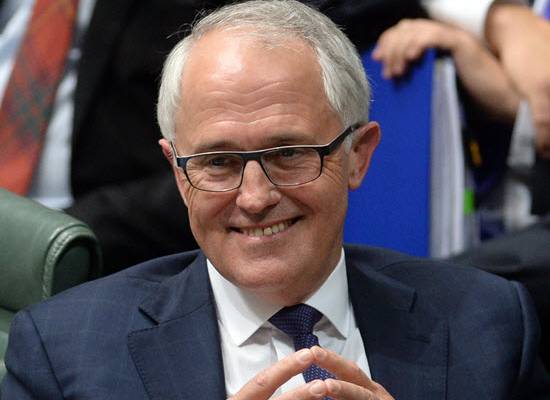
It’s an easy, and clichéd, criticism to make of Malcolm Turnbull that wouldn’t it be wonderful if he’d ever been in a position to actually implement so many of his wonderful progressive ideas like climate action.
But while the leather jacket has yet to make a reappearance, the post-prime ministerial “activist” Turnbull is providing plenty of fodder for harsh contrasts between his views now and his actions while in power.
At the weekend Turnbull was moved to castigate conservatives baying for the blood of Victoria’s Deputy Chief Health Officer, Annaliese van Diemen, over her comparison of the pandemic with the diseases brought by white invaders.
That stands in rather stark contrast to Turnbull’s behaviour as communications minister when an SBS journalist, Scott McIntyre, dared depart from the traditional jingoistic narrative about Anzac Day. Turnbull immediately picked up the phone to the then-SBS head, Michael Ebeid, to complain about the blasphemy.
McIntyre’s comments, Turnbull said at the time, “were so offensive that they deserved the widespread condemnation that they received”. Shamefully, Ebeid immediately sacked McIntyre. McIntyre and SBS later settled ahead of legal proceedings over the sacking.
Turnbull defended himself at the time by saying he didn’t sack anyone — SBS did. He repeated that defence when McIntyre had a crack at him at the weekend. “Well you weren’t sacked by me, Scott,” he primly replied.
Because, of course, the communications minister, who is in charge of SBS funding, calling the head of SBS to complain about a journalist’s tweets, and the subsequent sacking of that journalist, are entirely unrelated.
Anyway, no matter. That’s the free speech debate in Australia. It’s hard to find participants who don’t find free speech by their opponents a little less sacred and worthy of protection than free speech with which they agree — or which angers their opponents.
There’s another contrast that’s more substantial. Today Turnbull has criticised the predominance of consultants in the public service, which has led to its hollowing out. “You’ve basically had this ‘cult of the consultant’ to the point where the skills for doing so many things that are really core business are no longer in the public service,” he told Innovation Australia.
Turnbull is exactly right, and as prime minister he displayed far more interest in the public service than most prime ministers — especially his wretched predecessor, Tony Abbott, who took to the public service he inherited from Labor like a tantruming toddler.
Abbott’s treatment of Martin Parkinson, who Turnbull had brought back as head of prime minister and cabinet, was especially odious.
But Turnbull’s track record when it came to consultants in the public service is worth a look. Indeed, if there’s anyone who presided over the “cult of the consultant” it’s Turnbull.
The Grattan Institute, in examining data on the use of consultants in the public service (and how useless the Austender website is for such research) noted that 2016 marked a multi-year high point in the use of consultants, closely followed by 2017 (the Australian National Audit Office has similar numbers by financial year, showing much the same thing).
Moreover, during that time the big four consulting firms all secured a growing proportion of those growing consulting contracts, matching their rapidly growing political donations to both sides of politics over the past five years.
In the case of consultants, it isn’t just a cheap shot to observe that it’s a pity Turnbull wasn’t in a position to do something. The rise and rise of the big four consultants as deeply conflicted consultant/auditors, purveyors of (often mediocre) policy advice and prominent political donors is a hallmark of the past few years in federal politics.








Some consultancies can involve highly technical work, but some of the generic policy work the big firms conduct, and the way they conduct it, shows it’s
often just money for jam.
In many instances, a consultant need only win the job, then bombard the department with questions, the answers to which form the basis of a draft report that the consultant then sends back to the department to check! It is deeply conflicted and often not very high quality, although if the prices were anything to go by you’d assume you’d been counselled by the high priests and priestesses of Delphi.
Judging by some of the consultant crap I’ve had the misfortune to read, it did come from the seers at Delphi, who was usually barely conscious, let alone coherent due to the fumes from the volcanic fissure in the grotto.
Not to mention the regular diet of mushrooms and other fine herbs & exotic resins.
Your comment bears out the observation that a consultant is somebody who borrows your watch to tell you the time. They are yet another outrageous rort among the many to be found in the outsourced universe.
Rather like the line in the Pogues’ song “Boys from County Hell” – “lend me £10 and I’ll buy you a drink..”.
A moral delinquent.
I agree Malcolm is hypocritical, especially in relation to the hollowing out of the public service. In respect of climate change, he at least made an effort in the face of many of his troglodyte colleagues.
But I do congratulate him on using the correct Australian term for dismissal from employment. We get SACKED in Australia. In America only, you get ‘fired’.
Listened to a radio interview he did on abc Hobart the other day, and remembered why I disliked him. His justification for wrecking the nbn was tricky and dishonest, just not blatantly so like Morrison. Don’t know which is worse.
“But Turnbull’s track record when it came to consultants in the public service is worth a look. Indeed, if there’s anyone who presided over the “cult of the consultant” it’s Turnbull.”
And? Please keep going.
The numbers, the recipients etc.
We need to understand the effect of out hollowed out pubic service and their replacement by mercenaries.